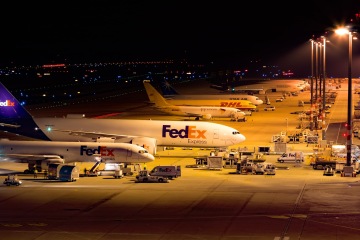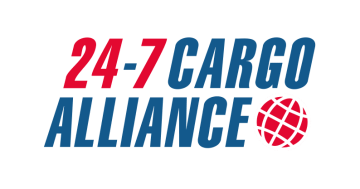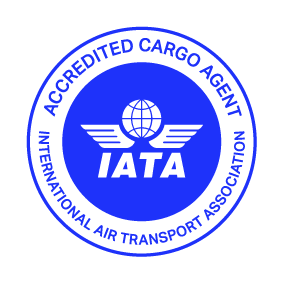FAQ Cargo
The most frequently asked questions about air freight.

Are you interested in air cargo transportation and would you like to know more? We have prepared a list of the most frequently asked questions and their answers. Whether it is the price of air cargo transportation, the reservation of this service or the necessary documents and formalities.
Questions and Answers
What is air freight and why is it beneficial?
It is the transportation of cargo by air or by an alternate air service (RFS). It is worth considering if the goods need to reach their destination in a short period of time and another mode of transport would not be able to cope. This applies to urgent shipments, with a short expiration date or somehow special in nature.
What are the main advantages of air freight compared to other modes of transport?
Its main advantage is speed.
How is the price of air freight quoted?
The price of air freight depends on many factors. The main ones are the dimensions of the shipment, weight, loadability, stackability, nature of the goods, delivery condition and the distance the goods need to be transported. The urgency of the shipment also matters a lot. It can be sent economically with delivery within 10 days, or in units of hours by special aircraft or services. Of course, the rates are then multiplied.
How long does air freight take?
It depends on the distance where the cargo needs to be delivered. Sometimes you have to wait for various permits or clearance. It also depends on the distance of the airport from the departure/arrival point and the booked flight.
What are the most common types of goods transported by air?
The most common are parts for critical infrastructure, urgent shipments of any kind, or military material.
What is the difference between cargo planes and regular passenger planes?
Cargo planes have space for additional cargo on the upper deck instead of seats. They can usually accommodate larger shipments than the hold, which is the same as on passenger aircraft. A large percentage of goods are also carried on passenger aircraft as dock cargo.
What is the maximum size and weight of cargo that can be transported by air?
It always depends on the type of aircraft operating a particular route. We always recommend checking with our expert. In general, small "narrow body" aircraft can hold cartons or small pallets. Larger "wide-body" aircraft are adapted to pallets and boxes up to 150-160 cm high. Larger and taller consignments must be transported by cargo aircraft.
What is the procedure for booking air freight?
It always starts with an enquiry form, which specifies where the goods are flying from and to, details and other special requirements. Of course, it is necessary to know the date of realization. Based on this information, our experts will prepare a quote. If the client accepts it, flights can be booked and transport organised.
What are the options for tracking cargo during air freight?
Airlines have individual tracking systems. Our experts can always check the current status of your shipment.
How is the security of the cargo ensured during the flight itself?
Cargo is packed on special air pallets or in air containers. When this is not the case, trained airline staff or their agents will ensure that the cargo is safely secured on board the aircraft. It is important to pack the individual cargo pieces so that they are secured on the shipping pallets and the goods cannot become loose during the flight.
What are the specific requirements for transporting dangerous goods by air?
The carriage of dangerous goods is governed by the very strict IATA Dangerous Goods Regulations. Packing, marking and declaration must always be carried out by trained personnel. It is always necessary to declare any dangerous article, substance, etc. that may be in the shipment.
What should I do if my cargo is lost or damaged during air freight?
You should always check your shipment carefully when you receive it. If it is incomplete or damaged, a record must be made (Cargo Damage Report). In case of loss, the claim is settled directly with the airline according to the international rules and the contract of carriage.
What is the role of customs formalities in air freight transport between different countries?
Customs formalities are not dealt with in the European Customs Area. On the contrary, in the case of export/import of goods to/from a third country, the goods must be cleared through the relevant customs procedure.
What's the best time to plan air freight when it comes to seasonal fluctuations?
The best time is definitely in the summer. Rates are lower than the rest of the year. The peak season starts from September to January.
What is the difference between a direct flight and a connecting flight for cargo?
It is the speed and likelihood of an operational deviation (delay of a subsequent flight, damage, customs clearance, etc.).
What are the common challenges in air freight and how do you deal with them?
The biggest challenge is to devise the entire transportation plan so that the goods arrive at their destination as quickly as possible and at a reasonable price.
What documents are required for air freight?
The main document is the air waybill. In addition to customs documents, a commercial invoice, packing slip, or various certificates are required.
Can cargo be transported by air to distant destinations?
Absolutely yes. It always depends on the quantity and nature of the cargo and, of course, the client's willingness to pay a higher freight price.
What are the different types of aircraft used for air freight transport?
The most commonly used are standard scheduled services from major manufacturers such as Airbus or Boeing. There are also special aircraft that can handle a variety of cargo.
What is the cost of air cargo insurance and is it recommended to have it?
Costs vary depending on the type of goods. We always recommend that our clients add insurance to their shipments, as the airline has limited liability for the shipment.
How is the price of air freight calculated?
It's a complex process that requires a lot of relevant information. It is normally calculated per kilogram of cargo. For bulkier goods, the rule of thumb is 1 m3 = 167 kg.
What are the terms of delivery?
It is a set of rules set by the International Chamber of Commerce. Basically, these are the rules about who pays for each service during transport and when. They are always set by the seller and the buyer.





